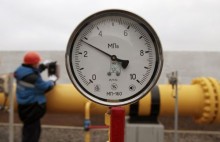By the end of May the parliament must decide if the gas transportation system stays in public property or is given to a private investor, as suggested by the government and, notably, our neighbors from the Kremlin.
The governmental draft law No. 2937 “On Amendments to some Legislative Acts of Ukraine with the Aim of Reformation of National Joint Stock Company Naftohaz of Ukraine” will be considered by the parliament in the next two plenary weeks, says speaker Volodymyr Rybak. According to the session timetable, it means May 14-17 and 21-24. “As soon as the draft is considered by the committees, we will debate it during these two plenary weeks,” said Rybak at a briefing. Draft No. 2937 is registered at the Committee for Economic Policy chaired by an opposition MP Andrii Ivanchuk, known to be proxy to one of the opposition leaders Arsenii Yatseniuk.
The essence of government’s legislative initiative is clear: repealing the ban on the privatization of state-owned subsidiary enterprises of NJSC Naftohaz of Ukraine, which manage the main pipelines and gas storage facilities, as well as companies, institutions and organizations created as a result of their reorganization. The Cabinet of Ministers suggests permitting the lease of major gas transportation facilities.
Experts are convinced that such an approach is contrary to Ukraine’s state interests. In particular, Valerii Borovyk of Alliance New Energy of Ukraine believes that “All this is being done for the sake of certain members of government and their private interests.” The very proposing of this draft means that the government has opted for a “pro-Gazprom” vector in the matter of modernization of Ukraine’s ageing gas transporting system (GTS), i.e. leasing it to a Russian monopolist or creating a consortium for two. It is the Kremlin that insists on reforming the GTS with a view to leasing (or better still, selling) it. When Russia’s incumbent Vladimir Putin was prime minister, and the current Prime Minister Dmitry Medvedev was president, Putin said: “If Ukraine’s government will, the Russian Federation can take part in its privatization.” Some time before that Moscow proposed to lease Ukraine’s GTS.
On the other hand, the EU has never and under no circumstances demanded permission to privatize its GTS, emphasize the experts. “The European Union wants to see the Ukrainian natural gas mining and transportation system in a state compatible with European legislation. It means that its operator should be independent from the government, corporations, or any other market players, and must function in accordance with market principles,” stressed Borovyk. This is exactly the content of the second and third energy packages of the European Energy Community, which Ukraine is now obliged to implement.
Thus, the Ukrainian parliament (supposing it is actually Ukrainian) must refuse the government’s draft and vote for the implementation of the third energy package of the European Energy Community. Borovyk believes that “If an MP stands for his nation’s interests, he must take the floor or say to the media that the draft law per se is not bad. But the time is not ripe. It is too premature. It should never be passed under this regime. Otherwise it will use the EU flag and the idea of reforming the oil and gas sector as a cover for privatization or rather giving away the GTS, following the top leadership’s private interests.”
Borovyk says that such strange ideas circulate also among the opposition politicians. For instance, at the meeting of the parliamentary committee on fuel and energy its chairman Mykola Martynenko assured that proposals would be prepared. “They simply do not react on the fly. And one more thing… Our opposition sometimes can turn into just ‘position,’ that’s all.”
However, neither the opposition nor government proposed alternative draft laws on implementing the third energy package. “They have enough experts to do this. I know that such drafts are being prepared by various groups, so to speak. Let them put them forward.”
Despite the opposition’s assurances the expert doubts that the governmental draft will be turned down by the parliament. “When this draft was being prepared for proposition, the Verkhovna Rada was blocked. And in my commentary to the media I said that soon we were going to see the true opposition as it is, and the worth of their ‘bayonets.’ If they unblock the parliament (which was then blocked) and allow to vote for one of the most crucial drafts of today, as Medvedev and Putin demanded, we would see the opposition’s true face and its financial sponsors. So now we are going to see opposition let this draft go through.” Borovyk is convinced that the parliament should be blocked to prevent voting for this draft: “We must go all out not to allow passing this law.”
“Let’s see how UDAR’s faction and a part of Batkivshchyna (Fatherland) are going to cope with the task. It will be very interesting. And now we will see who is who,” stressed Borovyk.
The Day tried to do its own survey on how many votes Draft No. 2937 can get. The survey included the keynote MPs: faction leaders and chairs of relevant committees. The response of the communists brought no surprise. The leaders of the CPU faction said to The Day that they “have always opposed the privatization of the strategic GTS and are not going to change their stand.” But the response of the so-called opposition MPs was surprising, to put it mildly: some knew nothing of it, the faction had not considered it, while some “had never heard of such a draft before.” Those who did hear something, even some Party of Regions MPs, promised that they would never vote for it. The government might simply want to win some time in the tug of war with Russia while negotiating with the EU, said Mykhailo Honchar, director of energy programs at the Nomos Center, in an interview to The Day. “There is a possibility that the draft will be killed by the parliament. Thus the eastern neighbor will get the message: the government would like to cooperate, but the parliament is against. So the lease issue will be canceled, and the ‘pipe’ will not change hands.”
It looks as though voting for the draft will indeed become the litmus test which will reveal the government’s priorities and the opposition’s quality.
COMMENTARIES
Oleh TIAHNYBOK, leader of Svoboda:
“We have information that this draft will be considered on Thursday, May 23. If this happens, we will do our best to prevent the privatization of the GTS. We consider it to be betrayal of national interests.
“We are going to appeal to society and ask people to rally outside the parliament on the day of the vote. We are interested in Ukraine’s independence in terms of energy supply.
“If Ukraine’s parliament voted as it should, this draft could have received a lot of amendments and comments. After all, the law banning the privatization of the GTS, which was passed by the previous parliament, is still in force. At the moment we with other opposition factions are considering the appropriateness of proposing an alternative draft.”
Ihor MARKOV, Party of Regions:
“I won’t vote until I have a clear idea of what they want to do with the pipe, and what the terms and costs are. Let the government suggests alternatives in managing the GTS, along with a thorough explanation of the necessity to privatize it. I will vote only if this will mean profit for Ukraine in all aspects.”
Volodymyr OLIINYK, Party of Regions:
“I have heard that the draft can be put to vote on Thursday, but so far I have not seen the text. We must not allow the country to lose the strategic gas transportation system. The Belarusian and Russian GTSs have already been upgraded. In my opinion, three parties should be involved in the upgrading of the GTS: the producer of the gas, the transporter, and the consumer.
“This is why I am going to vote for the draft. I trust the government in this aspect. It is the government that is responsible for the economic policy. If there is political will, at the meeting of our faction we will vote for the draft. And if the meeting passes such a decision, the entire faction will vote ‘for’ in the parliament.”
Oleksandra KUZHEL, Batkivshchyna:
“I am definitely not voting for this draft. Actually, I have so far not heard of its being passed by the committee. Neither has our faction considered it.”
Oksana PRODAN, MP for UDAR, first deputy chairperson, committee on taxation and customs policy:
“Draft law No. 2937 of April 26 ‘On Amendments to some Legislative Acts of Ukraine with the Aim of Reformation of National Joint Stock Company Naftohaz of Ukraine’ cancels the ban on privatization of Ukraine’s gas transport system. Notably, the regime is again concealing its appetites with the fig leaf of ‘ensuring measures for integration in the EU.’ In fact, the project hands over the right to manage one of Ukraine’s last assets to the Cabinet of Ministers. Consequently, it is a draft for privatization of public property by ‘the Clan.’
“In reality, all the necessary reforms in the oil and gas industry, including upgrading the GTS, could and must be carried out without the GTS changing hands.
“The UDAR faction stands up for leaving the gas transportation system in public property and reorganizing NJSC Naftohaz with the view to ensuring the transparency of its structures and activity.
“I think this draft will be rejected by the parliament. The opposition does not support it, and the communists cannot support privatization in any shape or form.”









